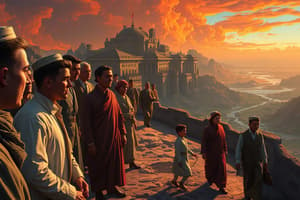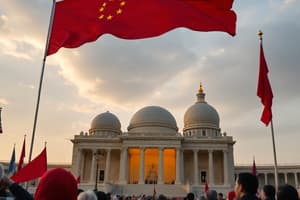Podcast
Questions and Answers
What was the National Origins Immigration Act established by Herbert Hoover in 1929?
What was the National Origins Immigration Act established by Herbert Hoover in 1929?
- Used a percentage basis for immigration
- Limited total immigration to 150,000 (correct)
- Changed quotas based on the 1930 Census
- Allowed unlimited immigration
What event is referred to as Black Tuesday?
What event is referred to as Black Tuesday?
Stock Market Crash on October 29, 1929
What is the Great Depression?
What is the Great Depression?
A worldwide economic depression starting with the collapse of the US stock market in 1929
What were Hoovervilles?
What were Hoovervilles?
What was the purpose of the Agriculture Marketing Act proposed by Hoover in 1929?
What was the purpose of the Agriculture Marketing Act proposed by Hoover in 1929?
What was the Young Plan of 1929?
What was the Young Plan of 1929?
What was the Hawley-Smoot Tariff?
What was the Hawley-Smoot Tariff?
What was the London Naval Treaty?
What was the London Naval Treaty?
When did Japan invade Manchuria?
When did Japan invade Manchuria?
What was the Reconstruction Finance Corporation (RFC)?
What was the Reconstruction Finance Corporation (RFC)?
What did the Federal Home Loan Bank Act of 1931 do?
What did the Federal Home Loan Bank Act of 1931 do?
What was the Hoover Dam known for?
What was the Hoover Dam known for?
Who were the Bonus Army?
Who were the Bonus Army?
What did the Hoover Stimson Doctrine state?
What did the Hoover Stimson Doctrine state?
What was the significance of the 20th Amendment?
What was the significance of the 20th Amendment?
What was the First New Deal?
What was the First New Deal?
What was a bank holiday during the Great Depression?
What was a bank holiday during the Great Depression?
What did the 21st Amendment accomplish?
What did the 21st Amendment accomplish?
What is the FDIC?
What is the FDIC?
What was the CCC?
What was the CCC?
What was the AAA?
What was the AAA?
What did the NIRA do?
What did the NIRA do?
What was the WPA?
What was the WPA?
What does SEC stand for?
What does SEC stand for?
What was the TVA?
What was the TVA?
What was the CWA?
What was the CWA?
What was the Home Owners Loan Corporation?
What was the Home Owners Loan Corporation?
What was the Share the Wealth Society?
What was the Share the Wealth Society?
What was the Indian Reorganization Act?
What was the Indian Reorganization Act?
What was the Good Neighbor Policy?
What was the Good Neighbor Policy?
What was the Atlantic Charter?
What was the Atlantic Charter?
What were the Four Freedoms declared by FDR?
What were the Four Freedoms declared by FDR?
What happened at Pearl Harbor?
What happened at Pearl Harbor?
What were internment camps?
What were internment camps?
What was the Battle of Midway?
What was the Battle of Midway?
What was the significance of the Invasion of Sicily?
What was the significance of the Invasion of Sicily?
What occurred at the Casablanca Conference?
What occurred at the Casablanca Conference?
What was discussed at the Teheran Conference?
What was discussed at the Teheran Conference?
What does D-Day refer to?
What does D-Day refer to?
What was agreed upon at the Yalta Conference?
What was agreed upon at the Yalta Conference?
What was the Battle of the Bulge?
What was the Battle of the Bulge?
What was the National War Labor Board's role?
What was the National War Labor Board's role?
What was the Office War Information?
What was the Office War Information?
How did women contribute to World War II?
How did women contribute to World War II?
How were African Americans involved in World War II?
How were African Americans involved in World War II?
What was the Office of Price Administration?
What was the Office of Price Administration?
Flashcards are hidden until you start studying
Study Notes
National Origins Immigration Act
- Enacted in 1929 under Herbert Hoover, it limited total immigration to 150,000 per year.
- Admissions were based on a country’s representation in the U.S. population as of the 1920 Census.
Black Tuesday
- Occurred on October 29, 1929.
- Marked the stock market crash that signaled the beginning of the Great Depression.
Great Depression
- Began with the 1929 stock market collapse, leading to a global economic downturn.
- Economic instability was worsened by heavy borrowing from the U.S. during WWI.
- Resulted in unemployment and countries raising tariffs to protect domestic industries.
Hoovervilles
- Shantytowns constructed by the unemployed during the early years of the Great Depression.
- Named “Hoovervilles” to symbolize blame towards President Hoover for the economic crisis.
Agriculture Marketing Act
- Proposed by Hoover in 1929 to assist farmers by maintaining agricultural prices.
- Established a federally sponsored Farm Board to implement loans and manage surpluses.
Young Plan
- Introduced in 1929 to renegotiate Germany’s WWI reparations payments.
- Reduced Germany’s payment obligations to 121 billion Reichsmarks, payable in 59 annuities.
Hawley-Smoot Tariff
- Instituted the highest import tax in U.S. history to preserve American jobs.
- Resulted in retaliatory tariffs from Europe, aggravating the economic downturn.
London Naval Treaty
- Signed on April 22, 1930, by major naval powers including the U.S., to regulate submarine warfare.
- Limited naval shipbuilding to enhance international peace and security.
Japan Invades Manchuria
- September 1931 invasion sparked by Japan’s interest in Manchuria's rich resources.
- Failure of the Lytton Commission due to delays allowed Japan to establish dominance unchallenged.
Reconstruction Finance Corporation
- Established in 1932 to provide loans to banks, railroads, and insurance companies.
- Aimed to facilitate economic recovery during the Great Depression.
Federal Home Loan Bank Act
- Enacted in 1931, it lowered mortgage rates to help homeowners and prevent foreclosures.
Hoover Dam
- A significant public works project that created jobs while providing necessary infrastructure in the Southwest.
Bonus Army
- Comprised of WWI veterans who marched to Washington D.C. in 1932 demanding immediate cash bonuses.
Hoover Stimson Doctrine
- Declared U.S. non-recognition of territorial acquisitions obtained through force, particularly regarding Japan’s actions in Manchuria.
20th Amendment
- Modified the presidential inauguration date from March 4th to January 20th.
- Also changed the commencement date for Congress to January 3rd.
First New Deal
- Aimed at providing "Relief, Recovery, and Reform" to alleviate the effects of the Great Depression.
Bank Holiday
- Implemented by Franklin D. Roosevelt in March 1933 to stabilize the banking system by temporarily closing banks.
21st Amendment
- Repealed Prohibition by terminating the 18th Amendment, allowing the sale of alcoholic beverages.
FDIC
- The Federal Deposit Insurance Corporation insures deposits in national banks and affiliated institutions.
CCC (Civilian Conservation Corps)
- Provided employment for young men aged 18-25 in conservation projects, flood control, and resource management.
AAA (Agricultural Adjustment Administration)
- Managed agricultural production via farm subsidies but was deemed unconstitutional in 1936.
NIRA (National Industrial Recovery Act)
- Allowed industries to create codes regulating production, wages, and working conditions, aiming to stabilize the economy.
WPA (Work Progress Administration)
- A vast relief program that funded diverse projects, including construction and arts, disbanded during WWII.
SEC (Securities and Exchange Commission)
- Established to enforce securities laws and regulate the stock market, ensuring transparency and fairness.
TVA (Tennessee Valley Authority)
- Created in 1933 to enhance navigation, flood control, and electricity generation in the Tennessee Valley region.
CWA (Civil Works Administration)
- An emergency program in 1933 providing jobs to over four million people in various public works projects.
Home Owners Loan Corporation
- Provided government loans to help homeowners avoid foreclosure during the Great Depression.
Share the Wealth Society
- Founded by Huey P. Long with the objective of redistributing wealth to provide cash grants to struggling families.
Indian Reorganization Act
- Passed in 1934, it restored tribal ownership of land, acknowledged tribal governments, and stimulated economic development.
Good Neighbor Policy
- Franklin D. Roosevelt’s approach aimed at non-intervention in Latin American countries, shifting from earlier aggressive policies.
Atlantic Charter
- Allied declaration signed in 1941 by FDR and Churchill, promoting peace and non-acquisition of territory following WWII.
Four Freedoms
- FDR's four essential freedoms articulated as: speech and expression, worship, freedom from want, and freedom from fear.
Pearl Harbor
- The Japanese attack on the U.S. naval base in Hawaii on December 7, 1941, which led to U.S. entry into WWII.
Internment Camps
- Established for Japanese Americans during WWII due to fears of espionage following the Pearl Harbor attack.
Battle of Midway
- A decisive U.S. victory in June 1942 that significantly weakened the Japanese naval fleet, marking a turning point in the war.
Invasion of Sicily
- Launched in July 1943, leading to Allied control over Italy and the subsequent overthrow of Mussolini.
Casablanca Conference
- A 1943 meeting where Allies agreed on unconditional surrender of Axis powers and planned the invasion of Italy.
Tehran Conference
- The 1943 meeting between FDR, Churchill, and Stalin focused on coordinating military efforts against Nazi Germany.
D-Day
- Allied invasion of Normandy on June 6, 1944, initiating a major offensive against German forces in Europe.
Yalta Conference
- 1945 meeting in which Allied leaders discussed post-war reorganization, including Soviet entry into the war against Japan.
Battle of the Bulge
- The last significant German offensive in the West during WWII, occurring in December 1944 against Allied forces.
National War Labor Board
- Established to negotiate labor disputes and ensure workers' rights while preventing strikes during wartime.
Office of War Information
- U.S. government agency that utilized art and media to shape public opinion and manage propaganda during WWII.
Women in World War II
- Significant female workforce participation in various roles, including manufacturing, driving, and policing, was necessary during the war.
African Americans in World War II
- Over a million African Americans served in segregated units and migrated north for wartime industrial jobs.
Office of Price Administration
- Implemented price controls on essential goods during WWII to prevent inflation and stabilize the economy.
Studying That Suits You
Use AI to generate personalized quizzes and flashcards to suit your learning preferences.




